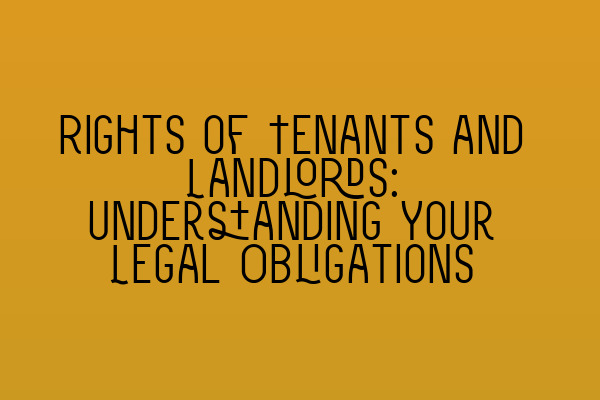Rights of Tenants and Landlords: Understanding Your Legal Obligations
As a tenant or landlord, it is crucial to understand your legal obligations and rights. Proper knowledge of your responsibilities will help ensure a smooth and amicable relationship between both parties. In this blog post, we will discuss the rights and obligations of tenants and landlords, providing valuable insights into the legal framework surrounding property law.
1. Security of Tenure:
Tenants have the right to security of tenure, which means that they can legally reside in a property until the tenancy agreement or lease ends. Landlords cannot evict tenants without proper reason and following the proper legal procedures. Understanding the rules around security of tenure is essential for both tenants and landlords to avoid unnecessary disputes.
2. Maintenance and Repairs:
Both tenants and landlords have responsibilities when it comes to property maintenance and repairs. Landlords must provide a safe and habitable living environment, ensuring that the property meets all health and safety standards. On the other hand, tenants are obligated to keep the property clean, report any repairs needed, and prevent further damage. Understanding the division of responsibilities between tenants and landlords in terms of maintenance and repairs is crucial to avoid conflicts and legal issues.
3. Rent and Rent Increases:
Tenants have the right to know the amount of rent they need to pay and when it is due. Landlords must provide proper notice for any rent increases and follow the guidelines set by relevant housing laws. It is essential for tenants to understand their rights regarding rent and rent increases to protect themselves from unfair practices. Similarly, landlords must be aware of the regulations to avoid potential legal pitfalls.
4. Right to Quiet Enjoyment:
Tenants have the right to enjoy their rented property without interference from the landlord. The right to quiet enjoyment ensures that landlords cannot enter the property without proper notice, except in cases of emergency. It is important for both landlords and tenants to understand and respect this right to maintain a healthy landlord-tenant relationship.
5. Deposit Protection:
Landlords are required by law to protect a tenant’s deposit in a government-approved tenancy deposit scheme. This protection ensures that tenants are eligible to receive their deposit back at the end of the tenancy, provided they meet their obligations. Understanding the regulations surrounding deposit protection will help landlords and tenants avoid disputes and legal complications.
6. Termination of Tenancy:
Both tenants and landlords have specific rights and obligations when it comes to terminating a tenancy. It is crucial to understand the proper notice periods and procedures to avoid unnecessary legal complications. Terminating a tenancy without following the correct legal framework can result in financial penalties or legal action.
Conclusion:
Understanding the legal obligations and rights of tenants and landlords is essential for maintaining a harmonious and legally compliant landlord-tenant relationship. By adhering to these obligations, both parties can avoid unnecessary disputes and costly legal battles. If you have any further questions or concerns regarding your rights and obligations as a tenant or landlord, it is always best to consult with a professional legal expert in property law.
For additional resources on related legal topics, we recommend checking out the following articles:
– SQE 1 Practice Exam Questions
– SQE 1 Practice Mocks FLK1 FLK2
– SQE 2 Preparation Courses
– SQE 1 Preparation Courses
– SRA SQE Exam Dates
Remember, knowledge is power when it comes to understanding your legal rights and obligations as a tenant or landlord. Stay informed, communicate openly, and seek professional advice when needed to ensure a positive and legally compliant property experience.
